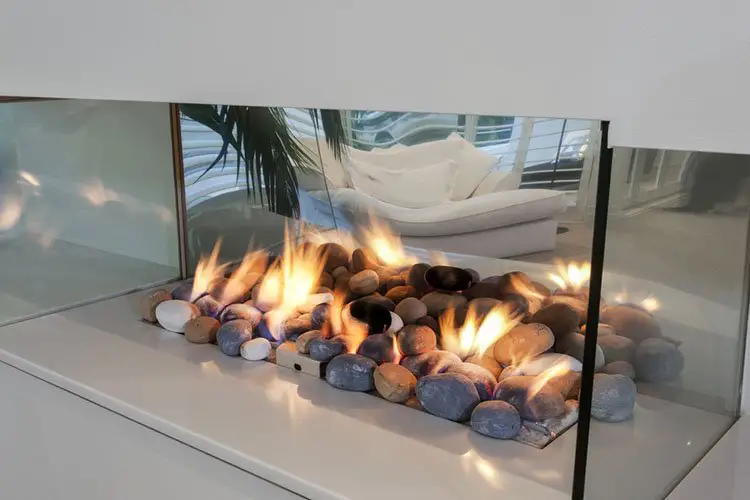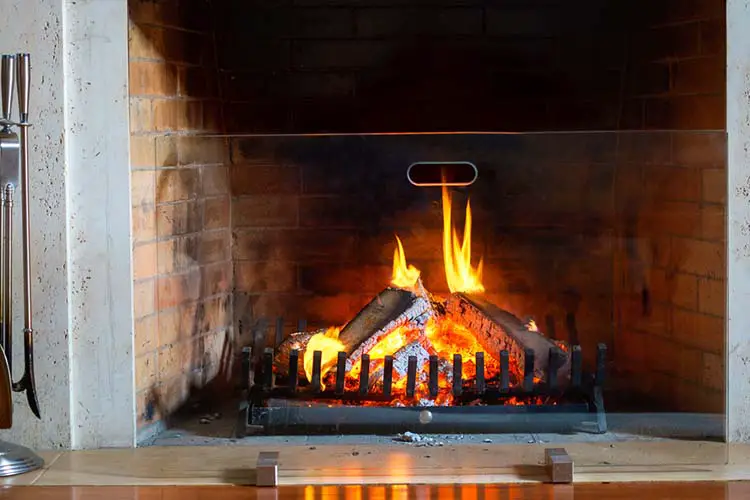Fireplaces are some of the most in-demand amenities in a home. The best place to be on a cold, rainy day is at the fireplace. It not only warms the body but also soothes the soul. If you ask homeowners about their preferences when it comes to fireplaces, most will say they prefer gas or wood-burning fireplaces for various reasons.
When deciding between a wood-burning or gas fireplace, you may want to consider which of them suits your lifestyle and home. You first need to start by reviewing the pros and cons of each. That said, here’s an in-depth comparison of gas and wood-burning fireplaces.
Gas Fireplaces
Gas fireplaces have been popular for some time due to their convenience for people who don’t like the hassle of dealing with firewood. You’ll never worry about gathering logs, chopping them, or finding dry storage space. Besides, there’s no mess from coal-raking, ash, and soot.
With a gas fireplace, it’s easy to spend warm moments with your loved ones next to a cozy fire. It provides plenty of heat at a low cost because most gas fireplaces are based on newer and more heat-efficient technologies. When you have more recent models of gas fireplaces at your home, all it takes to ignite them is pressing a button.

Pros of Gas Fireplaces
Here are some of the advantages of gas fireplaces.
- It’s pretty easy to turn on a gas fireplace. You can get the fire started by simply touching a switch, thermostat or pressing a button on the remote control.
- Gas fireplaces are energy-efficient. For starters, they are not powered by wood. Also, you can conveniently zone heat when using these appliances, especially if you’ve installed them all over your house. You can switch off your home’s central heating system before switching on a gas fireplace in any room you want.
- Maintaining a gas fireplace is relatively easy. There’s minimal cleaning up after using these appliances. Even so, annual inspections are necessary to guarantee the safe operation of your gas fireplace in the long run.
- You can keep using your gas fireplace even if there’s a power blackout.
- A gas fireplace has lower running costs than using electricity to warm your home. Besides, there’s no hassle relating to buying and storing wood.
- Gas fireplaces are an excellent source of warmth in a home. They have an output of up to 6kW, which is way more than what an electricity or wood fireplace provides.
- A gas fireplace has a modern look.
- You won’t need to invest in chimneys when you install one in your home.
Cons of Gas Fireplaces
Despite the numerous advantages that a gas fireplace gives you, it has some downsides. These include:
- High cost of installation. Qualified gas-safe engineers can only install a gas fireplace. The services of these professionals don’t come cheap.
- Gas fireplaces also require expert maintenance. It’s recommended that you have them inspected annually to guarantee safe use. Unless you install a flue-less gas fireplace, you’ll need to have your chimney cleaned at least once every year.
- Most gas fireplaces need to be mounted against an outer wall or in a chimney breast to ensure proper ventilation. Hence, appliances offer you fewer choices when it comes to the installation location.
- With a gas fireplace, the complete and authentic feel of a genuine fire isn’t there. For instance, there are no smells or the crackling sounds that aromatic firewood produces.

Wood Burning Fireplaces
There’s nothing like the romance of a roaring wood fire. They have an organic and down-to-earth feel about them, and they offer you the luxury of having a genuine wood-burning fireplace in your home. The crackling sounds of fire, the occasional sparks, and the smell of burning logs add a nostalgic and authentic ambiance to your home.
What’s more, if your wood fireplace is big enough, you can even cook on it, provided that you have the right cookware.
Of course, you will need a big pile of dry wood and a place to store it. For folks who live in the countryside, finding wood for their fireplaces isn’t difficult. But if you live in an urban area, you’ll need to have a storage area for keeping wood dry.
Wood burning fireplaces will need to be cleaned of ash and other debris when the fire is out. They also require a chimney for emitting smoke and soot which needs to be regularly cleaned by a professional chimney sweep.
Pros of Wood-Burning Fireplaces
- A wood-burning fireplace delivers more flames and heat than a gas fire.
- Nothing beats the feeling of sitting next to a cozy fireplace with a book or a cup of coffee. The ambiance, woodsy aroma, and cracking flames are unbeatable.
- You can use your wood fireplace at all times, including when you have no gas or electricity supply. Thus, wood fireplaces are ideal for off-grid living.
- You have a variety of choices in the type of wood you want to burn in your fireplace. Therefore, you can make your fire quick-burning, slow-burning, or even aromatic. Your options are limitless.
- With the right cookware and wood, you can prepare your family’s favorite dishes in a wood fireplace.
- They are an excellent choice for individuals with a strong affinity for real, authentic fire. Nothing beats the satisfaction of starting a fire and keeping it going all night long.
Cons of Wood-Burning Fireplaces
- They produce more soot and toxic gases than electricity and gas fireplaces. Thus, they are not positive for the environment.
- It takes time and patience to build a fire and get it going. Therefore, wood fireplaces are not ideal for individuals who crave instant warmth at the end of a long, cold day.
- It isn’t easy to collect, store, and season wood used in these fireplaces. Maintaining the required supply of wood can be a challenge.
- Regular chimney sweeping is necessary to clear debris from the chimney and prevent fires. This requires money and effort.
- Wood fireplaces are not energy efficient. A lot of heat is lost in the chimney.
- You always have to be keen when your fire is one. You can’t leave the house while the fire is still burning.
- Wood-burning fireplaces are not allowed in all homes due to building regulations.
Which is Right for You?
Ultimately, choosing between wood and a fireplace boils down to your preferences and lifestyle. If you’re eco-conscious and have a busy lifestyle, a gas fireplace will suit you for convenience.
Conversely, if you prefer an authentic fireplace experience with all the crackling, flames, and woodsy aroma, a wood-burning fireplace suits you best.
Both wood-burning and fireplaces come with lots of perks and downsides. The real question when choosing between the two is, which of them suits you best?

